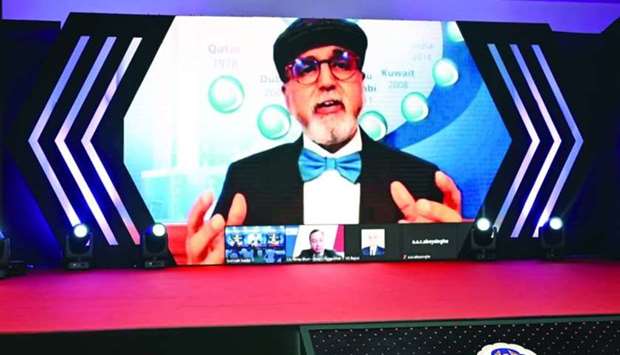The Institute of Chartered Accountants of India (ICAI) has honoured Doha Bank CEO Dr R Seetharaman during the ‘ICAI International Research Awards 2021’ hosted recently by the research committee of the ICAI and viewed by nearly 3,000 chartered accountants across the globe.
During the event, Seetharaman received the Silver Shield from Ramesh Bais, the event’s chief guest and governor of Jharkhand, for his research paper ‘Economic Implications of Global Citizenship’ in the Economics category.
Seetharaman is the first research paper presenter from Qatar to receive this award.
The event was also attended by the ICAI president Nihar Jambusaria, professionals, and other overseas chapter leaders. ICAI International Research Awards 2021 are considered to be the world’s largest cross-border competition in the research arena.
The 118 published research papers were received from 15 countries, which were reviewed by a panel consisting of subject matter experts, technical reviewers, and an international jury from different continents, which was chaired by Alan Johnson, president, International Federation of Accountants (IFAC).
Nirlep Bhatt, chairperson, ICAI Doha Chapter, introduced Seetharaman, who delivered a session on ‘Research Findings on Economic Implications of Global Citizenship’ during the technical session.
In the technical session, Seetharaman elaborated on a single world and global citizenship, saying: “Modern technology is creating a single world culture and promotes global citizenship.
“Today, there is a greater recognition that, as we move towards a borderless world, politics and economics have to converge at a global level and that territorial integrity is merely incidental. Economic integration will create more dynamic groupings and will transform the economies of many countries, hence, contributing to its sustainable development.”
On global governance, Seetharaman said: “If we are to sustain global growth, we have to define ways and means of building global partnerships. We must come together, not only in politics and economics but as individuals and societies. The world is full of opportunities if we recognise that it is borderless. Global citizenship is an essential paradigm as we live in a global village where moral and ethical responsibility.”
On youth empowerment and culture, he said: “Youth who do not receive a multicultural education are likely to view the interconnected society and economy as a threat rather than an opportunity. They also may passively perpetuate global injustices rather than work to create a better, shared future.
“Education for global citizenship helps enable young people to develop the core competencies, which allow them to actively engage with the world and help to make it a more just and sustainable place. Global citizenship encourages cultural diversity.”
Seetharaman also spoke on financial inclusion, digitisation, and global citizenship. He said innovations in technology, such as mobile payments, mobile banking, and borrower identification using biometric data, make it easier and less expensive for people to use financial services while increasing financial security.
“The impact of new technologies can be amplified by the private sector’s adoption of business models that complement technology platforms. In the 21st century, due to the over-influx of technology, customers are global citizens who connect online via multiple devices and social media networks and lead a digitised lifestyle. Technology has improved connectivity, enhanced exposures, and contributed to global citizenship.”
Seetharaman is the first research paper presenter from Qatar to receive this award.
The event was also attended by the ICAI president Nihar Jambusaria, professionals, and other overseas chapter leaders. ICAI International Research Awards 2021 are considered to be the world’s largest cross-border competition in the research arena.
The 118 published research papers were received from 15 countries, which were reviewed by a panel consisting of subject matter experts, technical reviewers, and an international jury from different continents, which was chaired by Alan Johnson, president, International Federation of Accountants (IFAC).
Nirlep Bhatt, chairperson, ICAI Doha Chapter, introduced Seetharaman, who delivered a session on ‘Research Findings on Economic Implications of Global Citizenship’ during the technical session.
In the technical session, Seetharaman elaborated on a single world and global citizenship, saying: “Modern technology is creating a single world culture and promotes global citizenship.
“Today, there is a greater recognition that, as we move towards a borderless world, politics and economics have to converge at a global level and that territorial integrity is merely incidental. Economic integration will create more dynamic groupings and will transform the economies of many countries, hence, contributing to its sustainable development.”
On global governance, Seetharaman said: “If we are to sustain global growth, we have to define ways and means of building global partnerships. We must come together, not only in politics and economics but as individuals and societies. The world is full of opportunities if we recognise that it is borderless. Global citizenship is an essential paradigm as we live in a global village where moral and ethical responsibility.”
On youth empowerment and culture, he said: “Youth who do not receive a multicultural education are likely to view the interconnected society and economy as a threat rather than an opportunity. They also may passively perpetuate global injustices rather than work to create a better, shared future.
“Education for global citizenship helps enable young people to develop the core competencies, which allow them to actively engage with the world and help to make it a more just and sustainable place. Global citizenship encourages cultural diversity.”
Seetharaman also spoke on financial inclusion, digitisation, and global citizenship. He said innovations in technology, such as mobile payments, mobile banking, and borrower identification using biometric data, make it easier and less expensive for people to use financial services while increasing financial security.
“The impact of new technologies can be amplified by the private sector’s adoption of business models that complement technology platforms. In the 21st century, due to the over-influx of technology, customers are global citizens who connect online via multiple devices and social media networks and lead a digitised lifestyle. Technology has improved connectivity, enhanced exposures, and contributed to global citizenship.”

